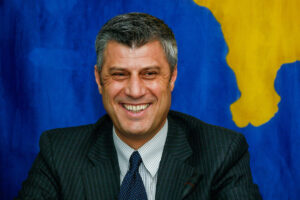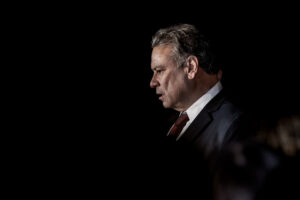In an exclusive interview with THE FRONTLINER Magazine, former Albanian Prime Minister and President Sali Berisha offers an in-depth perspective on the current geopolitical turmoil in the Balkans, focusing on Kosovo’s struggle for sovereignty amidst increasing regional tensions. This interview, conducted by Vudi Xhymshiti, explores Berisha’s views on Edi Rama’s controversial policies, the influence of George Soros, and Aleksandar Vucic’s aggressive stance towards Kosovo.
Vudi Xhymshiti: Mr. Berisha. Could you please share your insights on the developments in the region since 2013?
Sali Berisha: Since 2013, the geopolitical landscape of the Balkans has been significantly shaped by the Kremlin’s influence, particularly through figures like Aleksandar Vucic and George Soros. The policies promoted by Soros align entirely with those of Sergei Lavrov and the Kremlin. Before 2013, the European Union and the United States made serious efforts, culminating in a series of agreements between Pristina and Belgrade. These agreements, especially the General Agreement signed in 2013 and reaffirmed in 2015, effectively recognised Kosovo as an independent state by Serbia.
However, with Edi Rama’s rise to power in Albania, a dangerous alternative emerged. Despite initial opposition from the governments of Kosovo, Albania, and the United States, Rama pursued the idea of territorial exchanges and the division of Kosovo. In secret meetings with Vucic and Kosovo’s political leadership, he prepared a plan to divide Kosovo between Albania and Serbia, aiming to create a Greater Serbia. This approach was deeply troubling, as it threatened to undermine the stability and sovereignty of Kosovo.
Vudi Xhymshiti: Can you elaborate on Edi Rama’s role in these developments and the support he received from George Soros and other international figures?
Sali Berisha: Edi Rama’s involvement is particularly alarming. After his meeting with Vucic in Belgrade, with the Open Society Foundation in the background, Rama aggressively pushed the idea of border changes. He presented these plans as his own, though they were essentially recycled maps from the early 1990s. Rama’s secret negotiations and support from Soros significantly advanced this divisive agenda. George Soros himself sponsored and promoted these ideas, engaging various diplomats to push for territorial exchanges.
This plan was not only dangerous but also fundamentally flawed. The idea of redrawing borders based on ethnic lines opened a Pandora’s box of potential conflicts in the Balkans, a region already fraught with historical grievances and territorial disputes. By supporting such a plan, Rama risked reigniting ethnic tensions and undermining the fragile peace that had been achieved in the region.
Vudi Xhymshiti: You mentioned Vucic and the geopolitical implications. What are your views on Vucic’s political aggression towards Kosovo?
Sali Berisha: Vucic’s policies are deeply rooted in Serbian nationalism. His ambitions extend beyond Kosovo, seeking to establish Serbian dominance in the region. Vucic manipulates the Serbian minority in Kosovo, presenting them as an extension of the Serbian state. This destabilised Kosovo and undermined its sovereignty. Edi Rama’s support for Vucic only empowers these aggressive moves, posing a significant threat to regional stability.
Vucic’s strategy involves using the Serbian minority in Kosovo as a tool to further his political goals. By portraying them as victims of the Kosovo government’s policies, he garners sympathy and support from the international community while simultaneously destabilising Kosovo from within. This approach not only undermines Kosovo’s sovereignty but also exacerbates ethnic tensions, making it harder for the region to achieve lasting peace.
Vudi Xhymshiti: There have been sanctions against you by the United States. What is your perspective on this?
Sali Berisha: The sanctions against me are a direct result of Edi Rama’s corrupt lobbying and George Soros’s influence. Shortly after the sanctions were announced, I publicly challenged Secretary Blinken to present any evidence of my alleged wrongdoing. I believe these sanctions are unjust and driven by Rama’s attempts to suppress opposition to his policies. Despite these challenges, I remain committed to defending Kosovo’s sovereignty and opposing any plans to alter its borders.
It’s important to note that these sanctions were imposed eight years after I left office, which raises questions about the timing and motivations behind them. I have always maintained that these actions were politically motivated, driven by a desire to silence me and weaken the opposition to Rama’s controversial policies.
Vudi Xhymshiti: How do you interpret the involvement of other international figures, such as Daniel Vajdich and Gabriel Escobar, in this geopolitical landscape?
Sali Berisha: Daniel Vajdich and Gabriel Escobar have significant roles. Vajdich, with his connections to Vucic and influence in the Atlantic Council, promotes Serbian interests. Escobar, despite his official position, appears to be influenced by Serbian agendas, as indicated by his repeated calls for Kosovo to retreat its security forces. These actions undermine Kosovo’s sovereignty and align with the broader strategy to weaken Kosovo and strengthen Serbia’s position.
Vajdich’s influence in the Atlantic Council allows him to shape international policies in favour of Serbia, furthering Vucic’s goals. Escobar’s stance, calling for Kosovo to withdraw its security forces, directly undermines Kosovo’s ability to protect its sovereignty and maintain stability. These actions, whether intentional or not, play into the hands of those who seek to weaken Kosovo and assert Serbian dominance in the region.
Vudi Xhymshiti: Regarding the Open Balkan initiative, what are your thoughts on its impact on the region?
Sali Berisha: The Open Balkan initiative, initially branded as the Balkan Mini-Schengen, is another attempt to assert Serbian hegemony. It creates an unbalanced economic landscape that favours Serbia at the expense of other regional economies. This initiative, supported by both Soros and Lavrov, further integrates Serbia into the regional economy while isolating Kosovo. The participation of Alex Soros in these summits highlights the external influence driving these policies.
The Open Balkan initiative is presented as a means to enhance economic cooperation and integration in the region. However, the reality is that it disproportionately benefits Serbia, which has a stronger economy and greater resources than its neighbours. This creates an uneven playing field, where smaller economies like Kosovo’s are unable to compete effectively. By pushing this initiative, Serbia seeks to consolidate its economic dominance in the region, further marginalising Kosovo.
Vudi Xhymshiti: Mr. Berisha, could you elaborate on Serbia’s involvement in an open market with former Soviet republics and how this agreement benefits Serbia? Also, how does this tie into the Open Balkans initiative and its potential impact on Albania and Kosovo?
Sali Berisha: Certainly. Serbia’s participation in an open market with former Soviet republics, as part of the Eurasian Economic Union, provides it with significant economic advantages. This agreement allows Serbia to access a vast market with favorable trade terms, bolstering its economic position in the region. The benefits Serbia gains from this agreement include preferential trade conditions and the ability to export its goods without the heavy tariffs imposed by the European Union.
In the context of the Open Balkans initiative, Serbia aims to extend these advantages to its dealings within the Balkans. The Open Balkans, initially presented as a Mini-Schengen area, is designed to facilitate the free movement of goods, services, and people among the participKosoating countries—namely Serbia, Albania, and North Macedonia. However, this initiative, while seemingly beneficial on the surface, has underlying implications that could harm Albania and Kosovo.
The fundamental issue with the Open Balkans initiative is the lack of economic parity among the participating countries. Serbia, with its stronger economy and significant subsidies for its agricultural sector, can flood the markets of Albania and Kosovo with its products. This would lead to an unfair competitive environment, disadvantaging local producers in Albania and Kosovo who do not receive comparable levels of government support.
Furthermore, Serbia’s economic integration with the Eurasian Economic Union means that it can leverage its position to further dominate regional trade. The Open Balkans initiative would effectively create a platform for Serbia to expand its economic influence, undermining the economic sovereignty of its neighbors. This scenario poses a direct threat to the economies of Albania and Kosovo, potentially leading to the collapse of local industries unable to compete with subsidized Serbian products.
For Kosovo, the situation is even more precarious. The inclusion of Kosovo in such an arrangement, given its current political and economic fragility, would expose it to greater economic dependence on Serbia. This dependency could be exploited to exert political pressure, further compromising Kosovo’s hard-won sovereignty.
In essence, while the Open Balkans initiative is framed as a move towards regional cooperation and integration, it disproportionately benefits Serbia and risks exacerbating economic disparities in the region. For Albania and Kosovo, the potential economic harm is significant, threatening their domestic industries and overall economic stability.
Vudi Xhymshiti: Mr. Berisha, you mentioned a very interesting figure in American diplomacy – Gabriel Escobar. As a result of THE FRONTLINER’s investigations, we have found and reported documented allegations that Escobar’s wife could be financed by the Ministry of Foreign Affairs of the Republic of Serbia.
We published this finding on March 22 of this year. Despite our repeated efforts to get a response from the U.S. State Department, we have not received any answers. Another document – a contract – suggests the possibility that a law firm, where a close family member of American diplomat Gabriel Escobar could be a partner, has a contract with the Serbian leader of Bosnia and Herzegovina, Milorad Dodik. Can you tell us more about this, given that in your efforts to prevent the damaging geo-strategic projects concerning Kosovo and to thwart the regional ambitions of Republika Srpska, it seems Gabriel Escobar could be involved deeper than we may think, considering that he has repeatedly asked for you to be investigated for alleged corruption, despite the lack of evidence to this day, which you have also denied?
Sali Berisha: There is no doubt that my positions have greatly disturbed diplomats who, in one way or another, supported projects that, in my assessment, did not serve the stability of the Balkans but favoured Greater Serbia. I fully understand the efforts of the United States to have Aleksandar Vucic on board. However, I must say that, in my opinion, they have not properly understood Aleksandar Vucic. Vucic’s nationalism is entirely in line with the worst traditions of Serbian nationalism, and those who thought they could have Vucic on board have been wrong in every attempt.
Regarding Gabriel Escobar, if the allegations that his wife is financed by the Serbian Ministry of Foreign Affairs are true, he is in a clear conflict of interest. Personally, I do not have direct evidence that Escobar himself is financed by Belgrade, but if these connections are proven, it would raise significant concerns about his impartiality. Furthermore, in the context of the Balkans, the influence of George Soros cannot be overlooked. Soros has a considerable amount of power within the current U.S. administration, and his agenda aligns with promoting Serbian interests in the region, which complicates the situation even further. This influence was not as pronounced during the Obama administration, with which I cooperated closely.
The situation in the Balkans is very fragile, and these external influences, especially those that favour Serbia at the expense of Kosovo, only serve to destabilise the region. My firm stance against such projects has certainly made me a target for those who support these divisive strategies.
Vudi Xhymshiti: Finally, how do you see the future of Kosovo in light of these challenges?
Sali Berisha: Kosovo’s future depends on its ability to resist external pressures and assert its sovereignty. The international community must support Kosovo’s right to self-determination and oppose any attempts to change its borders. Edi Rama’s policies have been detrimental, but there is still hope if Kosovo’s leadership remains steadfast and the international community recognises and counters these divisive strategies.
The key to Kosovo’s future lies in its resilience and determination to uphold its independence. This requires strong leadership, unwavering commitment to sovereignty, and robust support from the international community. By standing firm against external pressures and maintaining a clear vision for its future, Kosovo can overcome these challenges and continue to build a stable and prosperous state.
Vudi Xhymshiti: Thank you for your insights, Mr. Berisha.
Sali Berisha: Thank you, Vudi. It is essential to continue these discussions and ensure that the truth about these geopolitical manoeuvres is brought to light.

Sali Berisha is a prominent Albanian politician who has served as both the Prime Minister and President of Albania. Born on October 15, 1944, Berisha is a cardiologist by profession and transitioned into politics during the early 1990s. He became the leader of the Democratic Party of Albania and played a significant role in the country’s transition from communism to democracy. Berisha’s tenure as President from 1992 to 1997 and as Prime Minister from 2005 to 2013 was marked by significant political and economic reforms, although his leadership was also marred by allegations of corruption and political unrest.
Sali Berisha’s sanctions by the United States were officially justified on the grounds of significant corruption during his tenure as Prime Minister, as stated by the U.S. Department of State. Announced in May 2021, the sanctions included a ban on Berisha and his immediate family from entering the United States. This decision came years after he left office, raising questions about the timing and motivations behind it. Berisha has vehemently denied the allegations, attributing the sanctions to corrupt lobbying efforts by Albanian Prime Minister Edi Rama and influence from George Soros. Subsequently, Berisha faced legal challenges in Albania, including the removal of his parliamentary immunity and house arrest, actions he claims are politically motivated attempts to suppress his opposition to Rama’s policies and his advocacy for Kosovo’s sovereignty.

Edi Rama is the current Prime Minister of Albania, a position he has held since 2013. Born on July 4, 1964, Rama is a painter, writer, and former Mayor of Tirana. As the leader of the Socialist Party of Albania, Rama has been a controversial figure in Albanian politics. His tenure has seen significant infrastructure projects and attempts to modernise Albania, but it has also been plagued by allegations of corruption and organised crime.
Rama’s government has faced accusations of deep involvement in organised crime, with critics alleging that his administration has facilitated drug trafficking and money laundering. Moreover, his alignment with Serbian policies, particularly his support for the Open Balkan initiative and allegations of secret negotiations with Serbian President Aleksandar Vucic, has drawn criticism. Rama’s actions are seen by many as undermining Kosovo’s sovereignty and aligning Albania more closely with Serbia’s geopolitical interests, which some argue benefits Russian influence in the region. These allegations have significantly tainted his political image both domestically and internationally.

Hashim Thaçi, a prominent Kosovar politician, has been a significant figure in Kosovo’s political landscape. Born on April 24, 1968, in the Drenica region, Thaçi played a crucial role in the Kosovo Liberation Army (KLA) during the Kosovo War (1998-1999), where he served as a political leader. Following the war, Thaçi transitioned into politics, founding the Democratic Party of Kosovo (PDK) and serving as Kosovo’s Prime Minister (2008-2014) and later as its President (2016-2020).
Throughout his political career, Thaçi has been a controversial figure, facing numerous allegations of criminal activity and corruption that have marred his contributions to Kosovo’s independence and political development.
Hashim Thaçi’s legacy is thus a complex one, marked by his role in Kosovo’s struggle for independence and subsequent state-building efforts, but also overshadowed by serious allegations of criminal activity and corruption. The ongoing legal proceedings against him, particularly at the Kosovo Specialist Chambers, continue to shape public and international perceptions of his political career and influence.

Gabriel Escobar is the former U.S. Deputy Assistant Secretary for the Western Balkans, where he oversaw policy and public diplomacy. He has held numerous diplomatic positions, including Deputy Chief of Mission at the U.S. Embassy in Belgrade and Economic Minister Counselor in Baghdad.
Escobar’s tenure as the U.S. envoy to the Kosovo-Serbia dialogue has faced scrutiny due to allegations of conflicts of interest. Reports by THE FRONTLINER have raised concerns about potential financial ties between his family and Serbian governmental bodies, questioning his impartiality. Following these reports, there have been reports of orchestrated attacks on independent journalism and democracy in Kosovo involving Escobar and his associates. These developments have prompted significant concern about the integrity of U.S. diplomatic efforts in the Balkans.

Aleksandar Vucic, the current President of Serbia, has a long history of involvement in nationalist policies and war crimes. As the Minister of Information under Slobodan Milosevic, Vucic played a key role in justifying the atrocities committed by Serbian forces, including crimes against humanity and genocidal campaigns during the Yugoslav Wars.
In recent years, Vucic has further aligned Serbia with Russia, signing a foreign policy alignment agreement in September 2022. This move has bolstered his aggressive stance towards Kosovo, culminating in his successful intimidation of Italy, France, and Germany in May 2024 to remove Kosovo’s membership in the Council of Europe from their agenda. Vucic’s administration has consistently undermined Kosovo’s sovereignty, most notably through covert operations and militia-backed disruptions in northern Kosovo, directly challenging international norms and regional stability.
Vucic’s tactics continue to destabilise the Balkans, exploiting ethnic tensions and leveraging international appeasement to further Serbia’s nationalist agenda. His actions demand a critical reassessment from global leaders committed to democracy and the rule of law.
This interview was recorded and conducted in Albanian, and the script is available for The Frontliner Magazine’s internal records and as a matter of proof of our reporting.
All material is © copyright to The Frontliner Magazine. This material is not allowed for republication without written consent from The Frontliner Magazine. Interested parties may reproduce up to 15% of the content and must refer their readers to The Frontliner Magazine for the complete interview.
Video and photo materials are available for editorial use upon request.
Stay informed on European political tensions and armed conflicts with our unique magazine. Subscribe for exclusive insights into current affairs and ongoing global issues.

